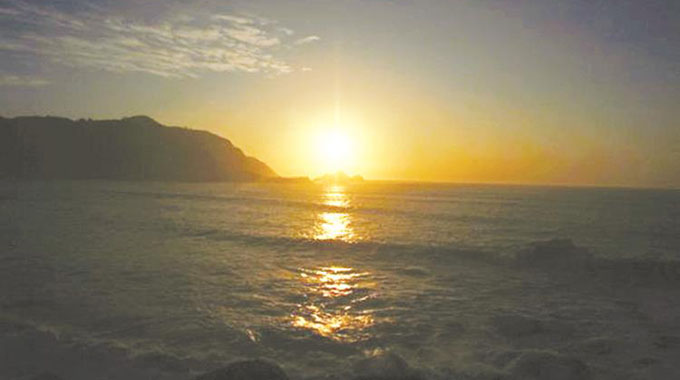Eyes to the sky, eyes on the ground is not farming

Friday Matrix Isdore Guvamombe
Sweltering sun rays ruthlessly struck the land, sucking moisture and baking the earth into cracked crust.
Day after day of cloudless skies ravaged crops, initially turning them into semi-wilt, then wilt and eventually into tinder dry biltong. Dead!
Under normal circumstances, farmers would have been in their fields, tending their crops, but being a drought year, they are spending time sitting on the shade of thatch-roof eaves, counting their losses.
Inglenooks remain ashen and dead cold as these are lean times and women know that cooking has to be systematic. Fire is only lit for a purpose.
Elders sit and intermittently cast eyes to the sky and on the ground, looking for any sign of rains. The signs are in dearth. The farmers are disheartened.
Farmers wonder if their relationship with the sky — the exclusive incubator of rains — has irretrievably broken down. The village is agog with sad news harbingered by previous droughts.
Farmers are looking for signs of rain, from the sky, from the ground, from the immediate environment, from the birds, from the crickets sounds, from the frogs, from little everything else and indeed from God and the ancestors, but there is just no sign.
There is no rainfall. Prayers have yielded nothing. Rain-making ceremonies have yielded nothing. Nothing, nothing and nothing. Nothing!
Casting eyes to the sky, on the ground and little everywhere else in search of rainfall signs each farming season is not farming. Farming is irrigation.
Again and again, droughts have ravaged them and their livestock.
As time ticks away, village elders realise the imminent loss is irreversible.
Rain-fed agriculture has once again failed them. They scratch their cotton tuft hair and wire-brush bearded chins for solutions to no avail.
The sky is once again stingy. God and the ancestors, have become as stingy as a Batalieu Eagle (Chapungu) that tawny eagle known for never dropping a feather. Drought!
A spitting distance away at Mashumbi Pools, the Agricultural and Rural Development Authority (Arda) Estates, flourish with thriving crops courtesy of irrigation. Highly mechanised and well-managed, the estate is the green lung of life; the vanguard of national food security. The whole village and beyond are now looking to survive on the estate. There is some solace there. It is known that the country will at least get some meaningful harvest.
Fast forward to 2019, where are the ARDA estates? Where? Should they not be at the centre of Command Agriculture? National food security?
There is need for new thinking, new understanding and new trajectory in Zimbabwe’s agriculture.
Since the land reform programme- which by the way was necessary to correct historical land tenure imbalances, one thing we have failed as a nation is a systematically established irrigation scheme. We must grow beyond our current rain-fed agriculture.
The Government should shift focus and ensure that as a starting point, one in every three villages have a small irrigation scheme. And, indeed ensuring that one in very five beneficiaries of the land reform has irrigation, small or big. This way, we are at least assured of enough to feed the family.
The world over, rain-fed agriculture is no longer sustainable and we are lagging behind. With climate change, rainy seasons are no longer reliable and benevolent.
Even weather experts are running hard behind to catch up with the speed of climate change. What used to be traditional farming seasons are no longer there. Gone are the days when we could predict when the rains would come.
Even seed houses are having sleepless nights trying to produce “desert-walker” varieties to beat the erratic weather patterns.
It is fact not fiction that every seed house in Africa has a headache on how to produce drought-tolerant, drought-resistant but high-yielding seed varieties.
Rain-fed agriculture is archaic, old fashioned and not for serious farmers.
Any country worth its salt now focuses on irrigation.
Until we stop relying on rain-fed agriculture, there is no farming we are talking about.
As a nation, we must move with the times. Time is not on our side. The land we took and the land we have, but we must go an extra mile to beat climate change.
There is no reason why should be food-insecure when we have the land and good farmers. Yes, we have some of the best farmers in the world, but we need irrigation. With irrigation you plant on time, manage your crop systematically and your yield is almost certain.
Besides, irrigation reduces land size. Where you plant several hectares, one hectare or less suffices because you can plant all year round.
Zimbabwe has many water bodies that lie idle or are used for recreational purposes.
It is fact not fiction that Zambia is irrigating from Lake Kariba in its winter maize crop. The worst thing is that Zambia copied from our winter wheat maize in Triangle pioneered by Masvingo province in 2001. The then President of Zambia Rupiya Banda, visited Chiredzi, copied and implemented a much bigger project in Siyavonga, across Kariba. We have not done anything with the Lake Kariba water except recreation and power generation.
The Zambezi River, the fourth largest river in Africa after Nile, Congo and Niger rivers has a long stretch in Zimbabwe running from Four Corners (Caprivi) to the north west to Kanyemba to the North East, but how many irrigation schemes does the Zamebzi water. Nothing meaningful!
Our take as a country should be on irrigation. Even in dry Chivi communal lands, Mutirikwi, Tugwi Mukosi, Manyuchi, Muzvwi dams are in the vicinity but nothing serious is happening in irrigation except in sugar plantations in yonder Chiredzi.
The millions of dollars we spent importing food should actually go into irrigation development.
Not that people should starve, for now, but Government should take deliberate policy to help farmers establish irrigation schemes.
The farmers are there, the will power is there, the water bodies are there and but what is not there is a well-crafted national irrigation policy, backed by sound water harvesting policies.
No matter how much the Government and the President gives people inputs, as long as there is no water, which is major component, the country will not sustain itself.
Our people are good farmers, they love farming but rain has been a big let-down and now with climate change showing its fangs, life is going to hard for farmers unless irrigation is given priority.
The water bodies are plenty. We have huge rivers passing through our farmlands.
We have ARDA estates that still lie idle. We need to put our heads together and agree on a holistic approach to boost agriculture production. Farmers appear useless when they do not have the means.
Government must invest seriously in irrigation. Farming is irrigation.
Feedback: isdore.guvamombe @zimpapers.co.zw








Comments